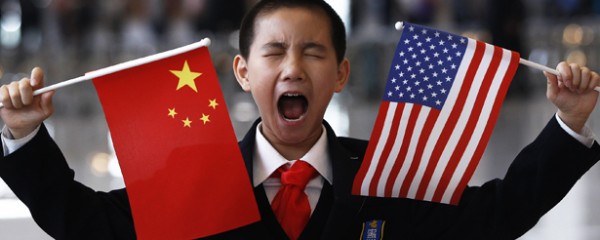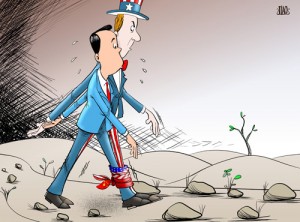05
Jun 2012
President Election & Sino-US Relation
For decades, the United States’ foreign policy regarding China has been a major debate topic in its presidential elections. As an election-year tradition, from Richard Nixon and John Kennedy in the 1970s, to Bill Clinton and George Bush in the 1990s, to Barack Obama and Mitt Romney (current frontrunner in Republican primaries) today, China occupied a featured spot in critical foreign policy discussions. American voters are wondering if Romney has a clear stance on his trade policy with China. If he does, his rhetoric about China so far shows only how shortsighted he is with regards to future U.S.-China economic and political relations.
Regardless of party affiliations, it seems that the tougher the presidential candidates get on China, the more support they tend to get from the American public. Tough-on-China rhetoric has become mainstream in U.S. politics; no viable presidential candidates can avoid it. Instead, each must take it to the next level in order to compete in the election.
Two of Mitt Romney’s first three television ads of the general-election campaign boast of how he’d stand up to China as soon as he becomes president.
Not to be outdone, President Barack Obama last week capped off a month during which he imposed or proposed duties on Chinese goods by warning their leaders to end unfair practices.
The rhetoric on China is escalating as the two candidates appeal to voters hurt by the decline in U.S. manufacturing. They’ll also find that translating tough words into action is harder than buying commercial time. Obama hasn’t carried out many of the tough-on-China policies he promised four years ago. Republicans already are expressing concerns that Romney is locking himself into a too hard-line position.
“Whenever someone goes from campaigning to governing, the realities of engaging China forces moderation,” said Charles Kupchan, a professor of international affairs at GeorgetownUniversity in Washington and a senior fellow at the Council on Foreign Relations. “Despite the economic difficulties here and the deindustrialization in important swing states, neither party has really gone to the mat once they’re in office.”
Public concern and candidate China-bashing has risen as U.S. has lost about 31 percent of its manufacturing jobs over the last 12 years. The issue comes up frequently as the candidates pursue voters in manufacturing-intensive swing states such as Ohio, Pennsylvania, and Michigan.
¨ Campaign Speeches
On the campaign trail, Romney labels China’s leaders as “cheaters” and “currency manipulators.” His ads say the Republican nominee would be a president who “stands up to China on trade and demands they play by the rules.” He’s vowed to issue an executive order labeling China a currency manipulator on his first day in office.
Democrat Obama took a similar stance when he was running for president in 2008. He called former President George W. Bush a “patsy” for not standing up to China in trade talks. In 2007, then-Senator Obama asked U.S. Treasury Secretary Henry Paulson to reverse a decision not to designate China as a currency manipulation.
Since winning the White House, Obama’s Treasury Department also has refused to designate China a currency manipulator.
The U.S. contends China is keeping the yuan artificially low to make its exports cheaper. The U.S. trade deficit with China was $21.6 billion in March, up from $19.4 billion in February, according to the U.S. Census Bureau. The total deficit in 2011 was $295 billion even as U.S. goods exports to China have almost doubled in the last five years, climbing to a record $104 billion, Census figures show.
¨ Slowing Growth
While the yuan has risen 31 percent since a dollar peg was ended in 2005, calls in the U.S. for more action may increase as economic growth slows in China and the government there looks for ways to spur imports. The yuan has fallen 1.1 percent since the end of last year, according to the China Foreign Exchange Trade System.
“There is obviously a widespread concern that China is an increasingly important and too often unfair competitor,” said Whit Ayers, a Republican pollster who conducted the survey. “China is now an integral part of any debate on the economy.”
Whoever wins the election in November may not be able to afford following through on campaign rhetoric. The U.S. must work with China on critical foreign policy issues such as reining in Iran and North Korea’s nuclear ambitions and ending violence in Syria, Kupchan said.
Obama’s language illustrates the tension.
¨ ‘Enough’s Enough’
At a news conference concluding a trade meeting in November in Hawaii, Obama said “enough’s enough” on the slow appreciation of the yuan. He announced in his JanuaryState of the Union address the creation of a trade enforcement unit “charged with investigating unfair trading practices in countries like China.”
Yet in February, when he met with Chinese Vice President Xi Jinping in the Oval Office, the president had a more nuanced message of wanting to “work with China” and “ensuring that there is a balanced trade flow between not only the United States and China, but around the world.”
Last month, the administration was highlighting a get-tough approach. On May 17, the Commerce Department announced tariffs of 31 to 250 percent on imports of Chinese solar cells. On May 30 the agency proposed duties as high as 26 percent on imports of wind-towers from China and the U.S. International Trade Commission determined that imports of high-pressure steel cylinders from China harm American producers.
“We’ve brought trade cases against China at nearly twice the rate of the previous administration,” Obama said at a May 30 ceremony to sign the reauthorization of the U.S. Export- Import Bank.
¨ Republican Primaries
China-bashing was a frequent part of the debate in the Republican presidential primaries, and Romney, who emerged victorious, didn’t shy away from the topic.
Jon Huntsman, Obama’s former ambassador to China and a candidate in the Republican primaries, accused Romney of promoting policies that would risk a trade war and said he “doesn’t quite understand this situation.”
Huntsman, who withdrew after failing to gain enough support in the early contests, said the rhetoric on China is following “a typical trajectory” during the campaign. “Then you get in office,” he said in a May 24 CNN interview.
Daniel Sneider, the associate director for research at the WalterH.ShorensteinAsia-PacificResearchCenter at StanfordUniversity, said he doesn’t take Romney’s tough talk on China seriously.
¨ Corporate Interests
“He’s from a party that heavily represents the interests of corporate America,” Sneider said. “Does corporate America want to engage in an economic war with China? No.”
Lanhee Chen, policy director for the presumptive Republican presidential nominee, said while Romney’s plan for “robust” action to confront China on trade issues may be at odds with some in his party and Democrats, it is at the core of his strategy for improving the economy.
“Here’s a place where Governor Romney is really calling for a different approach,” Chen said in a June 1 interview on Bloomberg Television’s “Political Capital With Al Hunt.”
White House officials have called Romney’s stance hypocritical, citing a Romney family blind trust that has holdings in a Bain Capital fund that purchased a Chinese video surveillance company. And in his 2010 book, “No Apology,” Romney criticized Obama for imposing tariffs on tire imports from China.
China is facing its own challenges. China’s economy may grow in 2012 at its slowest pace in 13 years, a Bloomberg News survey in May showed, as Europe’s debt crisis curbs exports, manufacturing shrinks and demand for new homes wanes.
“Ironically the biggest threat right now to the U.S. economy and to the world economy is not China taking over the world, it’s China going into a significant economic slowdown,” Sneider said.
Tough-on-China policies may help political campaigns this year, but they will not help the U.S. in the long term. American politicians eager for a trade war with China are rather self-serving, and they may well create an unacceptably high cost for American families as well as in the long-run for the U.S. with regards to U.S.-China bilateral relations. There is no doubt that a fair and mature relationship with China will serve U.S. interests better with respect to creating American jobs and fostering sustainable economic growth.
From Business Week, China.org.cn
– See more from: http://www.sbeintl.com/
































